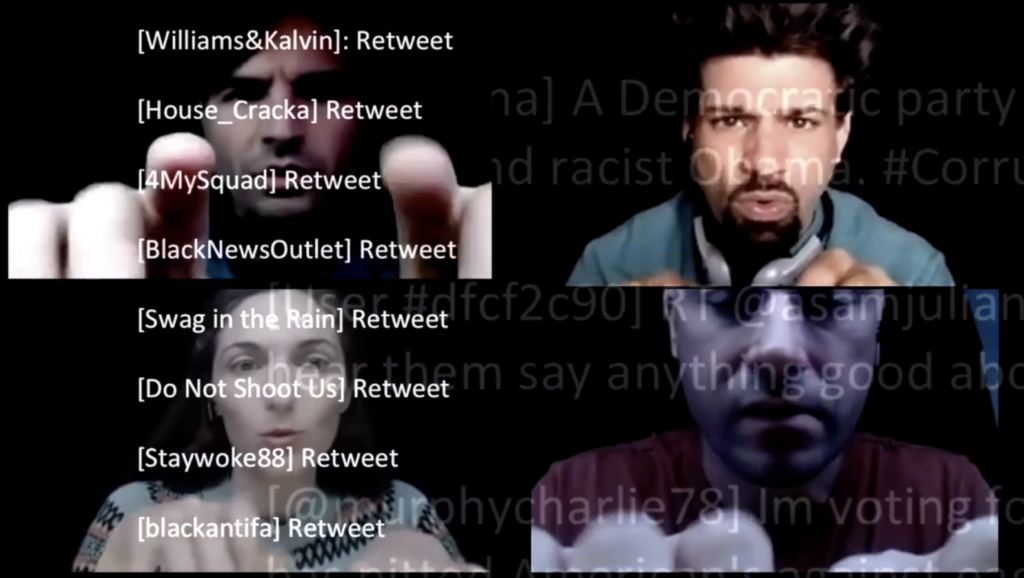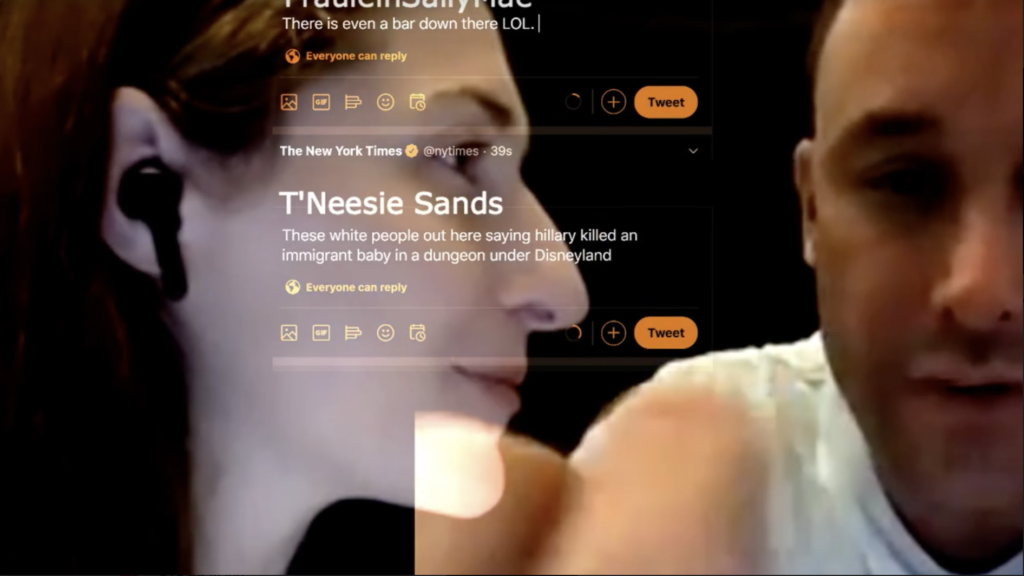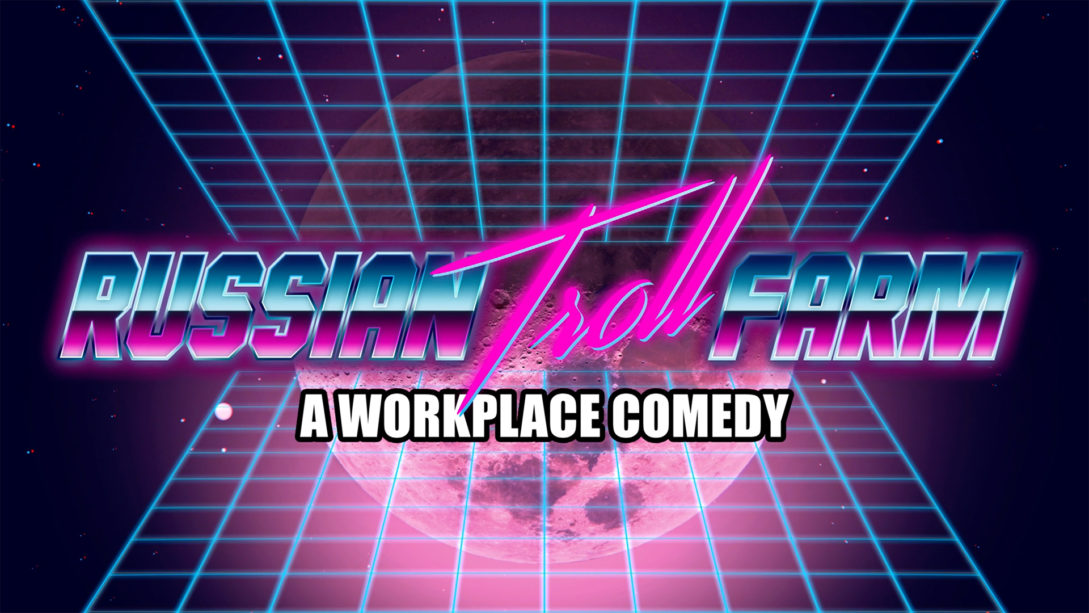It is an understatement to say that playwright Sarah Gancher was disappointed when theaters shut down in March 2020. “I thought to myself,” she says, “I’ve just finished this play that I love, that I really feel has to be seen before the election, and now it’s dead in the water.” That play, Russian Troll Farm: A Workplace Comedy, was designed to be performed in the midst of electoral politics and the online whirlwind that comes with them: the show takes on the infamous Internet Research Agency, where professional Russian internet trolls work for days at a time to influence American popular opinion, creating the illusion of consensus—or conflict.
The inspiration for Russian Troll Farm struck Gancher during the 2016 election cycle, when, like many anxious Americans, she found herself scrolling endlessly through her social media feeds. As election day drew closer, Gancher started to notice some strange behavior online.
“Things started feeling darker and darker every time I went on to Facebook and every time that I went on to Twitter,” says Gancher. “I started noticing, ‘Who are all these people online, and what is this weird slang where people are talking like they don’t know English? These were mistakes that nobody would ever make if they actually spoke English. A lot of pro-Trump stuff started showing up in my Facebook for no discernable reason. Facebook started telling me that a ton of my friends like Donald Trump, people I knew for certain that that was not true because we had had conversations about it.”

After the election, in an attempt to make sense of what had happened, Gancher started researching this surge of online political vitriol and made a startling discovery, “I started to find out, ‘Wow, ok, so a lot of accounts I followed were actually Russian trolls, that’s good to know, and it totally worked on me.’ They absolutely succeeded in making me feel like maybe there was not going to be too much of a difference between Trump and Hillary; they absolutely succeeded in making me feel apathetic at times and other times feeling ashamed that I was going to vote for Hillary. And I saw them succeed on the other side of the aisle as well and I thought, wow, this is so interesting that they’re working both sides equally but to different ends.”
A lot of accounts I followed were actually Russian trolls… and it totally worked on me.
Sarah Gancher
Gancher then began to think about the trolls themselves, the people who work seven days a week to emotionally terrify the electorate of the United States. What motivated them? How did they feel about what they were doing?
These questions make up the backbone of Russian Troll Farm, which is currently receiving a digital premiere via a live Zoom production mounted by TheaterWorks Hartford and TheatreSquared in association with the Civilians.
“Sarah Gancher’s play is precisely the kind of work The Civilians exists to champion,” said The Civilians’ Artistic Director Steve Cosson. “Sarah is boldly engaging with immensely important real-life stuff and doing so with a keen sense of storytelling and exuberant humor. And through the alchemy of theater, she gives us a fictional story that makes the otherwise unbelievable truth of our political situation feel real. It’s a remarkable feat—to create something that’s both wildly entertaining and a bracing wake-up call.”

As we approach election day, this wake-up call is even more necessary—just as we saw in 2016, the Internet Research Agency has taken to social media to manipulate voter opinions on this year’s presidential race through false news stories and impassioned tweeting from fake accounts. Co-Director Elizabeth Williamson strives to make sure that the fact that these Russian trolls are fact is known. “The media wasn’t covering in as much depth, up until this month, what the Internet Research Agency did and how they impacted the 2016 U.S. presidential election. It felt like the most important story that we weren’t really hearing about to me,” says Williamson. “So that felt like, if there’s a way […] to tell that story and make people actually realize when they look at their Facebook, Instagram or Twitter feeds that anyone they don’t know might actually not be a real person, that seemed really, really important. The Russians very deliberately stoked fires that were already there in America to try to get people not to vote, to try to get people to vote for our current president, and it seemed like the more we could get that story out before the next election the better. Whatever political party you belong to, whichever side you’re on, it’s important to realize the degree to which social media can be used to manipulate and is used to manipulate.”
Even beyond its relevance to the upcoming election, Russian Troll Farm is a play designed for 2020. In keeping with both the subject matter and the current pandemic, the show has gone completely digital—filmed, edited, and streamed live for the internet. Rather than be thrown by the need to bring theater, an inherently live medium, to an online audience, Williamson says Russian Troll Farm has only thrived. “This is a play that would be as exciting online as it would be in person, which I think is pretty rare. And with Jared Mezzocchi, Co-Director, Multimedia Designer, especially, being able to unlock it for the internet felt like, ‘Oh, that’s a project that wants to be done right now, that wants to be done in this medium, and that is the perfect play to use to start to create this new form of a ‘site-specific play for the internet’.”

The process itself was as unique as the notion of digital theater for the modern era, as well. “It’s almost like every day is a tech rehearsal,” says actor Greg Keller, who plays Nikolai, an IRA supervisor and aspiring screenwriter, in the online production. “As somebody who usually performs live, there’s a certain fun and comfort and excitement of [performing live on Zoom]. That’s a world I know well and understand, and to be doing it in the comfort of your own home feels very safe. But in another way you’re at the mercy of all this technology and all of this support that’s coming from all over the place, people in different rooms, in different parts of the country. I have set up LED lights around my computer that are controlled by a lighting designer, who’s not in the same state as me, in real time.”
“We’re trying to do one of the first fully produced online productions, so it’s not just a reading or a workshop, we’ve got a sound designer, we’ve got a lighting designer, we’ve got a costume designer, set consultant, and in four weeks we’re trying to figure out how all those design elements work online, what an online production is, how the actors work,” says Williamson. “We’re spending this month inventing a new form while using that form to tell a world premiere play. It’s a really innovative, exciting time, kind of crazy, kind of cobbled together, but also really thrilling to be working on.”
We’re spending this month inventing a new form while using that form to tell a world premiere play.
Elizabeth Williamson
Gancher, while initially skeptical of presenting this online production live, is thrilled with the end result. “There is something about this actually being live and knowing that we’re us having to pull it all off in real time… To me, it helps you feel that thing that you feel in a theater with other people, when you’re all together and you’re watching something live. It has that sort of communal feeling about it.”
After five successful performances, Russian Troll Farm has been extended due to popular demand until November 15th. Still, the creative team holds on to the hope that they will one day be able to mount the show live in a theatre. Hopefully, the themes of the show will be less relevant by the time that comes to pass. “I would really love it if this play in a couple years was a curio that was telling us about this crazy time in 2016 and 2020 when people interfered with how we perceived our elections, but that’s not gonna happen in the next month,” says Williamson.
“We go forward to make something new,” assures Gancher. “And when we can be back together in person we’ll be back together in person. I still hope to see this play live with actors in front of an audience. That would be amazing, but it’s gorgeous to go ahead and make something new right now. I feel hopeful.”
Tickets for Russian Troll Farm can be purchased online here. Please visit https://www.russiantrollfarm.com/ for more information.
To learn more about The Civilians and to access exclusive discounts to shows, visit our website TheCivilians.org.
Author
-

Phoebe Corde (she/her) is a dramaturg, writer, and illustrator from Westport, Connecticut, specializing in stories of the strange, magical, and otherworldly. She is currently Resident Dramaturg at The Civilians, where she is director of their artistic development group, the R&D Group, and is a member of the creative board of directors at Off-Brand Opera. Her dramaturgical work has been seen on Broadway and Off-Broadway stages, including The Public Theater, Vineyard Theatre, A.R.T., Paper Mill Playhouse, Oregon Shakespeare Festival, Ensemble Studio Theatre, and 59E59.
View all posts









